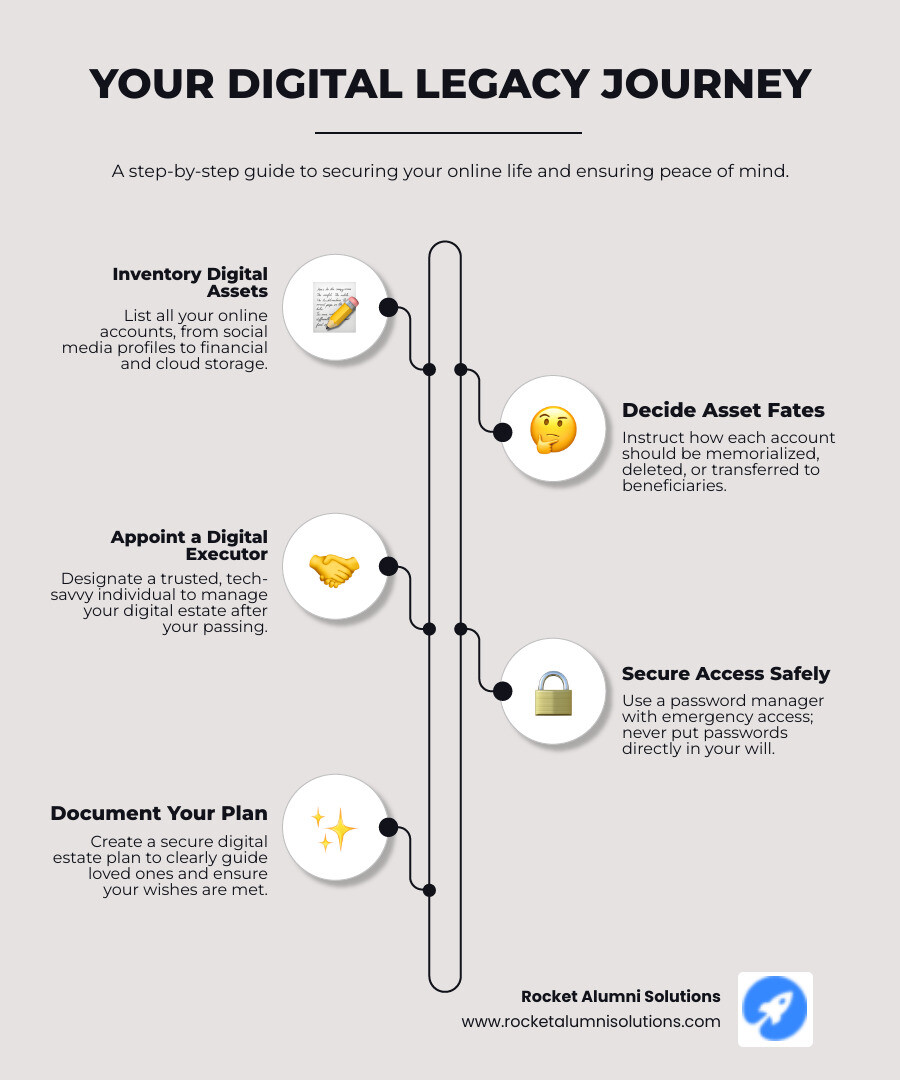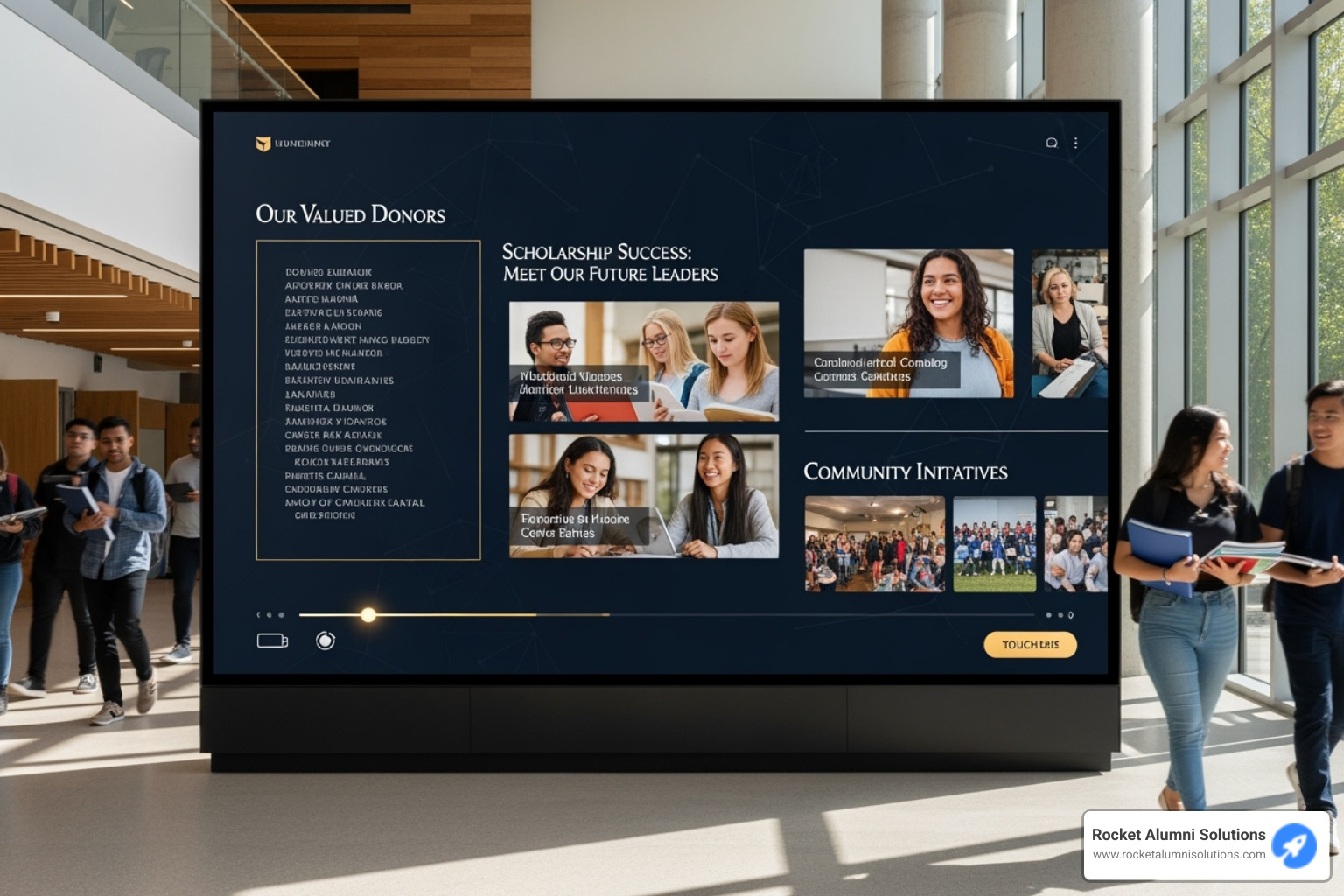Why Digital Legacy Solutions Are Essential in Today's Connected World
Digital legacy solutions help you organize, protect, and transfer your digital assets to loved ones after you pass away. These services ensure your online accounts, photos, and documents don't become lost or inaccessible to your family.
Quick Overview of Digital Legacy Solutions:
- Password managers with emergency access features
- Digital vault services for secure document storage
- Estate planning apps with digital asset management
- Platform-specific tools like Google's Inactive Account Manager
- Professional digital legacy services that handle the entire process
The average person has over 100 online accounts, and 65% of people feel anxious when critical information is scattered. Without proper planning, billions in digital assets remain unclaimed by rightful beneficiaries.
Your digital life contains irreplaceable memories, from family photos in the cloud to social media posts. When someone passes away without a digital plan, families often struggle to access these precious memories or important financial accounts.
The good news is that planning your digital legacy isn't overwhelming. Modern solutions make it simple to catalog accounts, store access information securely, and provide clear instructions for your loved ones.
I'm Chase McKee, Founder & CEO of Rocket Alumni Solutions. We've helped thousands of communities preserve their digital histories, and through this work, I've seen how vital digital legacy solutions are for protecting both individual and institutional memories.
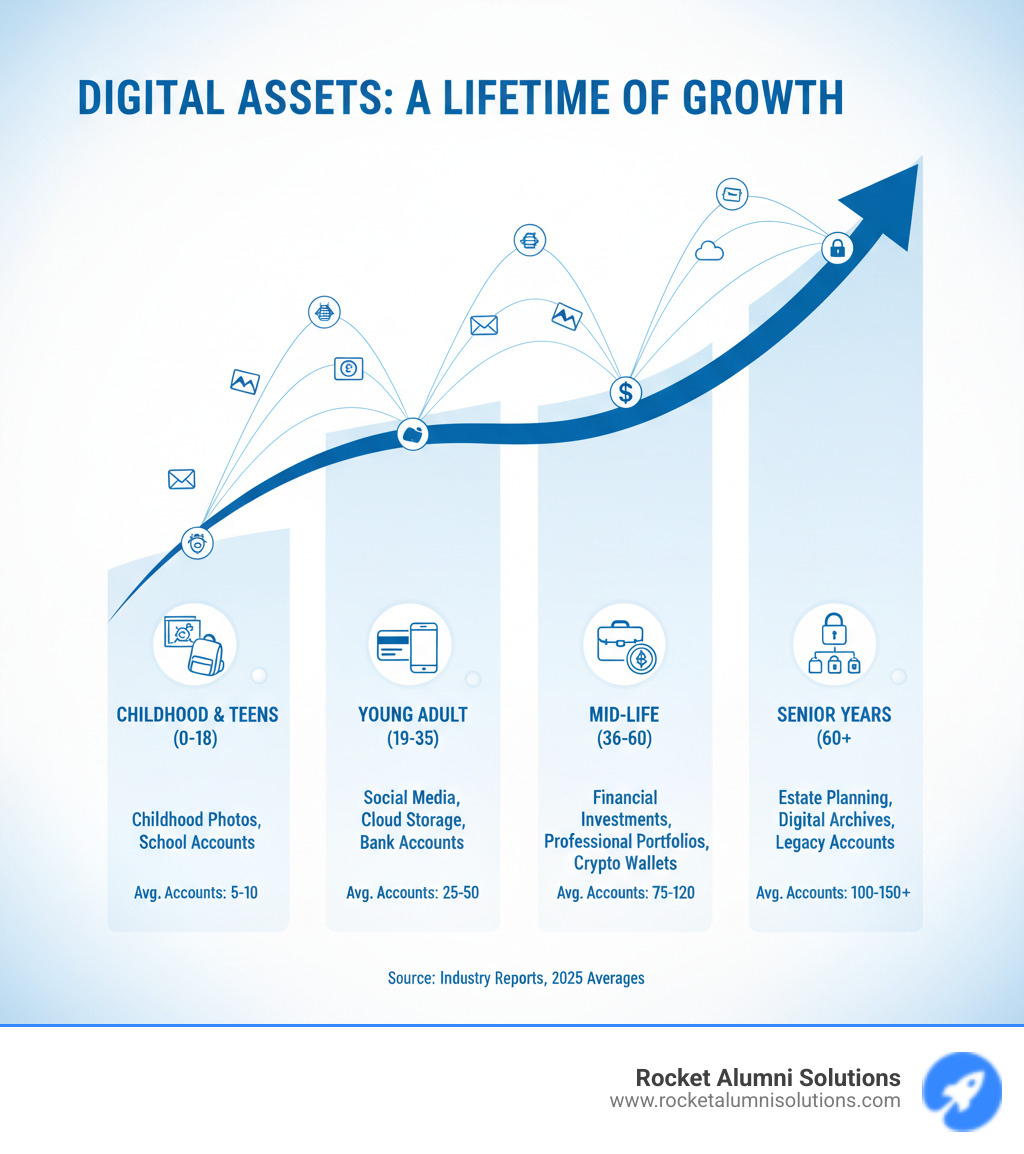
Every day, you add to your digital footprint—the collection of online accounts, files, and interactions that define your modern life. After you pass away, this footprint becomes your digital legacy. It's everything you've created and stored online, and it doesn't disappear when you do.

Your digital assets have both sentimental value, found in family photos and social media posts, and financial value, hidden in online bank accounts, crypto wallets, and domain names.
Without a digital plan, families face a maze of locked accounts. Research shows that between £15bn and £77bn in unclaimed assets are waiting to be found. This means real families are missing out on inheritances because accounts were unknown or inaccessible. The emotional burden is also immense, as families may be unable to access precious memories. Digital legacy solutions prevent this by ensuring your digital world remains accessible to those who matter most.
Common Types of Digital Assets
Your digital life is more complex than you might think. It includes:
- Social media accounts: Facebook, Instagram, and LinkedIn hold photos, messages, and connections that tell your life story.
- Email accounts: These contain everything from legal documents to treasured conversations.
- Photos and videos: Cloud services store irreplaceable memories like family vacations and milestones.
- Cloud storage: Services like Google Drive and Dropbox house important documents and personal files.
- Financial accounts: Online banking, investment platforms, and PayPal need careful management to prevent fraud and ensure beneficiaries receive their inheritance.
- Cryptocurrency: Digital wallets for Bitcoin, Ethereum, and NFTs require specific keys to access and can be lost forever without a plan.
- Domain names and websites: These digital properties can be surprisingly valuable.
- Digital intellectual property: E-books, music, or other creative work you've published online are part of your legacy.
- Subscription and gaming accounts: These can incur ongoing charges or contain valuable in-game assets.
The Risks of Ignoring Your Digital Legacy
Leaving your digital life unplanned creates serious problems:
- Identity theft: Unmonitored accounts are vulnerable to cybercriminals who target the deceased.
- Lost family memories: Without access to cloud or social media accounts, precious photos and videos could vanish forever.
- Unclaimed financial assets: Billions in bank accounts, investments, and crypto holdings never reach rightful beneficiaries.
- Unnecessary stress: Grieving families face the overwhelming burden of dealing with tech companies and guessing passwords.
- Misrepresentation of your memory: Unmanaged social media accounts can be targeted by scammers or post automated content, creating a digital presence that doesn't reflect who you were.
These risks make digital legacy solutions essential for protecting your family's emotional and financial well-being.
A Step-by-Step Guide to Planning Your Digital Legacy
Creating a digital estate plan is an act of love that protects your family from stress. By taking charge of your digital life now, you provide clear instructions and prevent guesswork. Once your plan is set up, you can rest easy knowing your digital world is organized and secure.

Step 1: Inventory Your Digital Assets
First, create a master list of your digital assets. Start with social media, email, and banking apps, then move to cloud storage, subscriptions, cryptocurrency wallets, and domain names.
For each account, record the service name, username, linked email, and answers to security questions.
The best practice is to use a reputable password manager with emergency access features. These services let you designate a trusted person who can request access to your passwords after a waiting period. This keeps your information secure while you're alive but accessible when needed. Never store passwords in your will, as it becomes a public document.
Step 2: Decide the Fate of Each Asset
Next, decide what happens to each asset. This is where you specify your wishes.
- Memorialize: Platforms like Facebook and Instagram can freeze an account, allowing friends to leave tributes.
- Delete: Specify which accounts you want permanently removed.
- Transfer Ownership: For assets with financial value like cryptocurrency or domain names, provide clear instructions for transferring them to beneficiaries.
- Archive Data: Ensure precious data, like family photos on Google Photos or documents in Dropbox, is downloaded and saved for your loved ones. You can learn more about preserving history through digital solutions.
Step 3: Appoint a Digital Executor
Your digital executor is the trusted person who will carry out your digital wishes. This role has significant responsibilities, so choose someone who is both tech-savvy and understands your values.
Their duties include closing accounts, transferring assets, managing social media memorialization, and archiving data. This person can be your regular will executor or someone different.
It's crucial to legally appoint your digital executor in your will or another estate planning document to grant them the necessary authority. You can learn more about the digital executor role and its legal requirements.
Finally, communicate clearly with your chosen executor. Walk them through your plan, show them where your asset inventory is stored, and explain your wishes. This conversation is a vital gift to them and your family.
Navigating the Technical and Legal Landscape
The rules for our online accounts after we pass away are still catching up. Each platform has its own policies, laws vary, and Terms of Service agreements evolve. Understanding these basics is a key part of planning with digital legacy solutions.
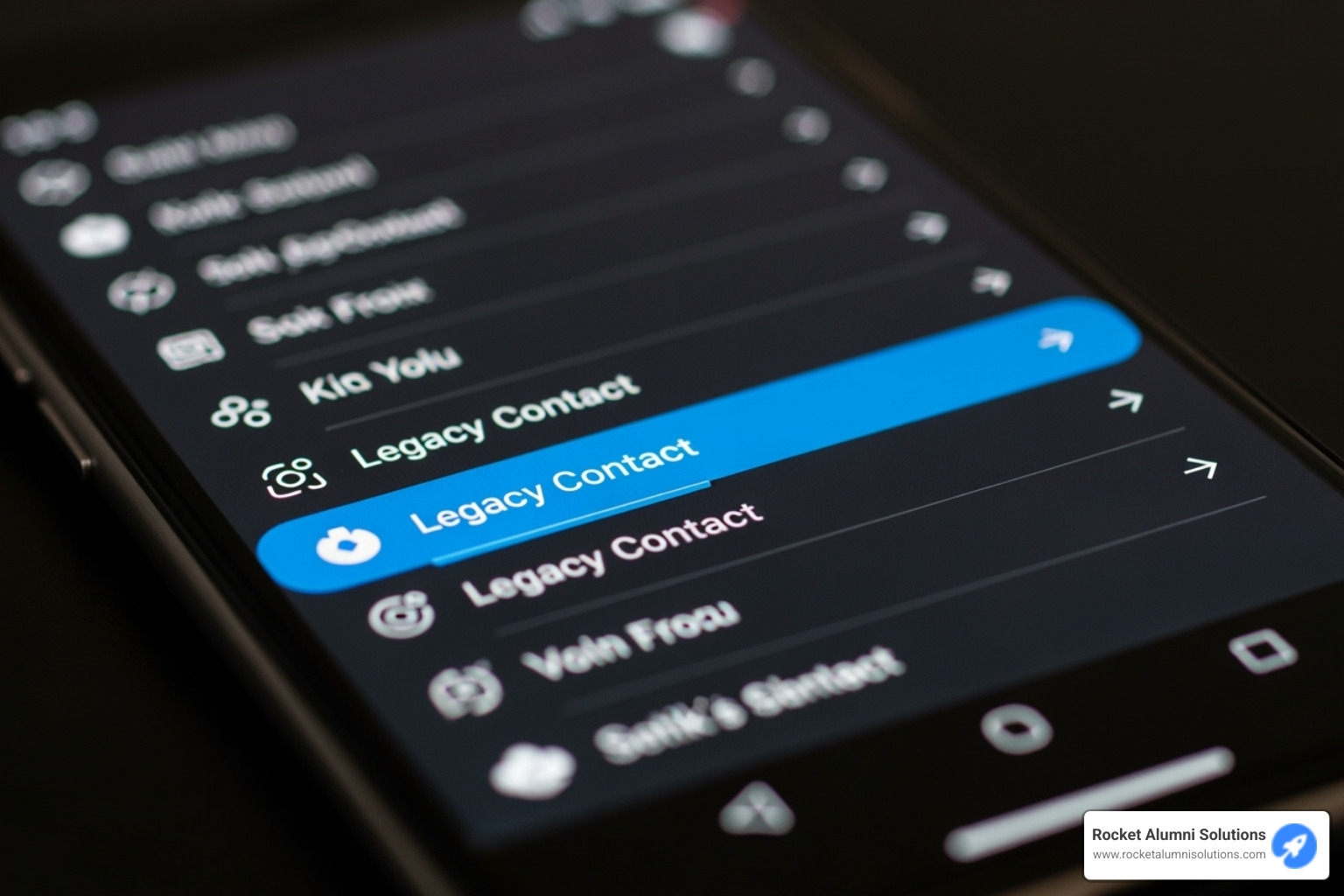
How Major Online Services Handle Deceased User Accounts
Major services balance user privacy with helping grieving families.
- Social media platforms like Facebook and Instagram offer memorialization, which freezes an account but keeps it visible with a "Remembering" banner. You can designate a "legacy contact" to manage parts of the memorialized account.
- Google's Inactive Account Manager lets you proactively decide what happens if your account is unused for a set period, such as sharing data with a trusted contact or deleting it.
- Apple's Legacy Contact feature allows a designated person to access your iCloud data after you pass away using a special access key and a death certificate. This helps with things like removing Activation Lock from devices. You can learn how to request access to a deceased family member's Apple account.
The inconsistency across platforms highlights the need for a comprehensive plan. Just as we help preserve collective stories with Interactive Digital Community Timelines, these tools help you control your own narrative.
Legal Considerations for Your Digital Assets
The legal framework for digital assets is new. Most states have adopted the Uniform Fiduciary Access to Digital Assets Act (UFADAA), which gives executors legal authority to access and manage digital accounts.
However, UFADAA only grants access; it doesn't provide instructions on what to do with the assets.
This is why your personal digital estate plan is crucial. Your will should grant your digital executor clear authority to manage assets according to your wishes, preventing guesswork. As the legal landscape evolves, planning ahead with digital legacy solutions is essential for protecting your wishes and your family's peace of mind.
Exploring Key Digital Legacy Solutions
As our digital lives grow more complex, organized digital legacy solutions are more important than ever. These tools act as a digital safety net, delivering the pieces of your online life safely to your loved ones. Modern solutions offer a variety of tools for centralized management and robust security.
- Password managers with inheritance features: Services like LastPass, 1Password, and Dashlane offer "emergency access" options. You designate a trusted contact who can request access to your passwords after a set waiting period, making this a practical solution.
- Encrypted digital vaults: Platforms like DGLegacy and Everplans use bank-level encryption to store sensitive documents, passwords, and final instructions in a digital fortress.
- All-in-one life planning apps: These go beyond digital assets to help organize legal documents, medical information, and household details, creating a central command center for your life.
- Specialized digital inheritance services: These services focus on your digital afterlife, often using "heartbeat protocols" that automatically notify beneficiaries if you stop checking in.
The Benefits of Using Professional Digital Legacy Solutions
Professional solutions offer peace of mind through advanced security and automation.
- Improved security: Your information is protected by advanced encryption and multi-factor authentication.
- Automated processes: "Heartbeat protocols" ensure your wishes are carried out automatically, removing the burden from grieving family.
- Guided setup: Structured templates help you inventory your digital assets systematically, reducing the anxiety that 65% of people feel about scattered information.
- Peace of mind: Knowing your affairs are in order allows you and your family to rest easy.
- Centralized information: Your executor gets everything they need in one secure location, simplifying their task. Just as we at Rocket Alumni Solutions provide Digital Legacy Solutions for communities, these tools empower individuals to safeguard their own narratives.
Digital vs. Traditional Estate Planning
Traditional and digital estate planning work together but cover different areas. Understanding the distinction is key to a complete plan.
| Feature | Traditional Will/Estate Plan | Digital Estate Plan |
|---|
| Scope of Assets | Physical property, financial accounts, tangible heirlooms | Online accounts, digital files, cryptocurrency, social media, email |
| Access Methods | Legal documents (will, deeds), physical keys, bank access | Usernames, passwords, access keys, platform-specific protocols |
| Legal Standing | Legally binding, processed through probate court | Increasingly recognized (e.g., UFADAA), but platform terms of service and personal instructions are crucial |
| Update Frequency | Typically updated infrequently (every few years, or after major life events) | Needs frequent updates (new accounts, password changes, evolving wishes) |
| Executor Roles | Manages physical and financial estate as per will | Manages online presence, data, and accounts as per digital instructions |
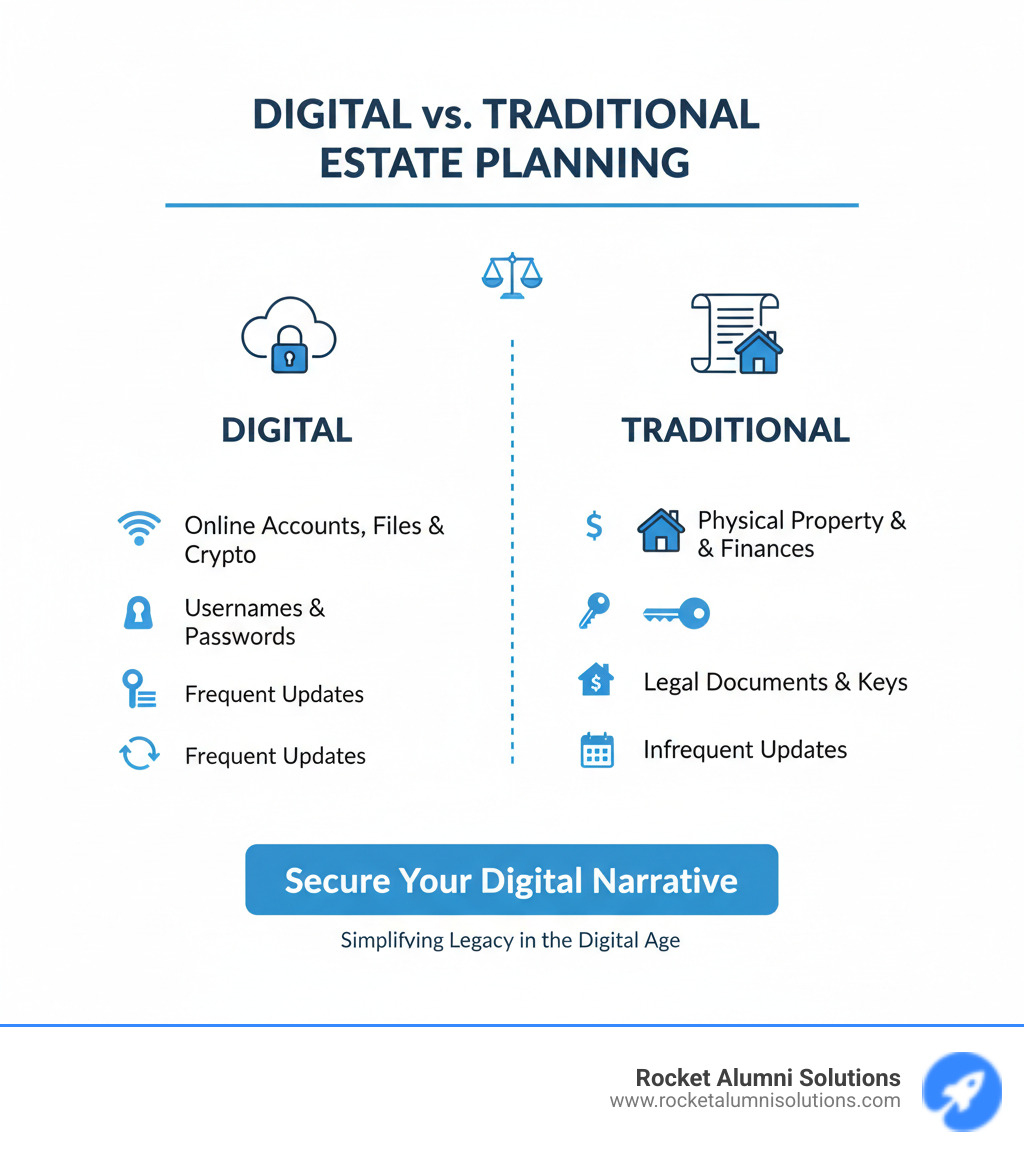
The key takeaway is that digital estate planning requires more frequent attention than traditional planning. Your online life changes constantly, so your digital plan needs regular maintenance to remain effective.
Frequently Asked Questions about Digital Legacy Planning
Planning your digital legacy solutions can feel overwhelming, but most people have similar questions. Here are answers to the most common concerns.
What is the difference between a digital legacy and a digital estate plan?
Your digital legacy is the entirety of your online footprint—all your accounts, files, and data. It exists whether you plan for it or not.
A digital estate plan is your formal set of instructions detailing what should happen to those assets. It's the roadmap you create to guide your executor, specifying whether to memorialize, delete, or transfer your digital property. A digital estate plan only exists if you create one.
How can I ensure my passwords are secure but accessible to my executor?
The best method is to use a reputable password manager with an emergency access or digital inheritance feature. You store your credentials in its encrypted vault and designate a trusted contact.
You can set a waiting period (e.g., 30 days). If you don't log in during that time, your contact can request access. The system notifies you, and if you don't respond, access is granted. This balances security during your lifetime with accessibility for your executor afterward.
Should I put my passwords directly in my will?
No. A will becomes a public document after probate, meaning anyone could potentially access the passwords stored within it. This creates a major risk of identity theft and fraud for your estate.
Instead, your will should reference the location of your secure digital estate plan. For example: "My digital estate plan is stored with [service name], and my digital executor [Name] has been granted access." This keeps sensitive information private while giving your executor the legal authority they need. The goal of digital legacy solutions is to balance security with accessibility.
Conclusion
Planning your digital legacy is an empowering and loving act for your family. It's about organizing your digital life to bring peace of mind today and provide a clear roadmap for your loved ones tomorrow.
As we've seen, digital legacy solutions are about preserving your story, protecting assets, and ensuring your wishes are honored. Proper planning transforms a potentially chaotic situation into a manageable process for your family, giving them the confidence to carry out your instructions.
At Rocket Alumni Solutions, we understand the importance of preserving legacies. We partner with communities from Dartmouth College to the PGA Tour, helping them commemorate their histories with interactive recognition displays. Whether creating a Digital Hall of Fame or a dynamic legacy wall, we believe every story deserves to be preserved. This work reminds us daily why individual digital planning is so vital.
Don't let your digital life become a source of stress for those you love. You don't have to do everything at once. Start small by listing your most important accounts or exploring one of the digital legacy solutions discussed. This journey is about valuing your living story and ensuring your digital footprint reflects who you are.
Your digital presence deserves the same care as any family heirloom. Take the first step today to give yourself and your family the gift of peace of mind.
Explore the future of preserving memories with digital yearbooks.
